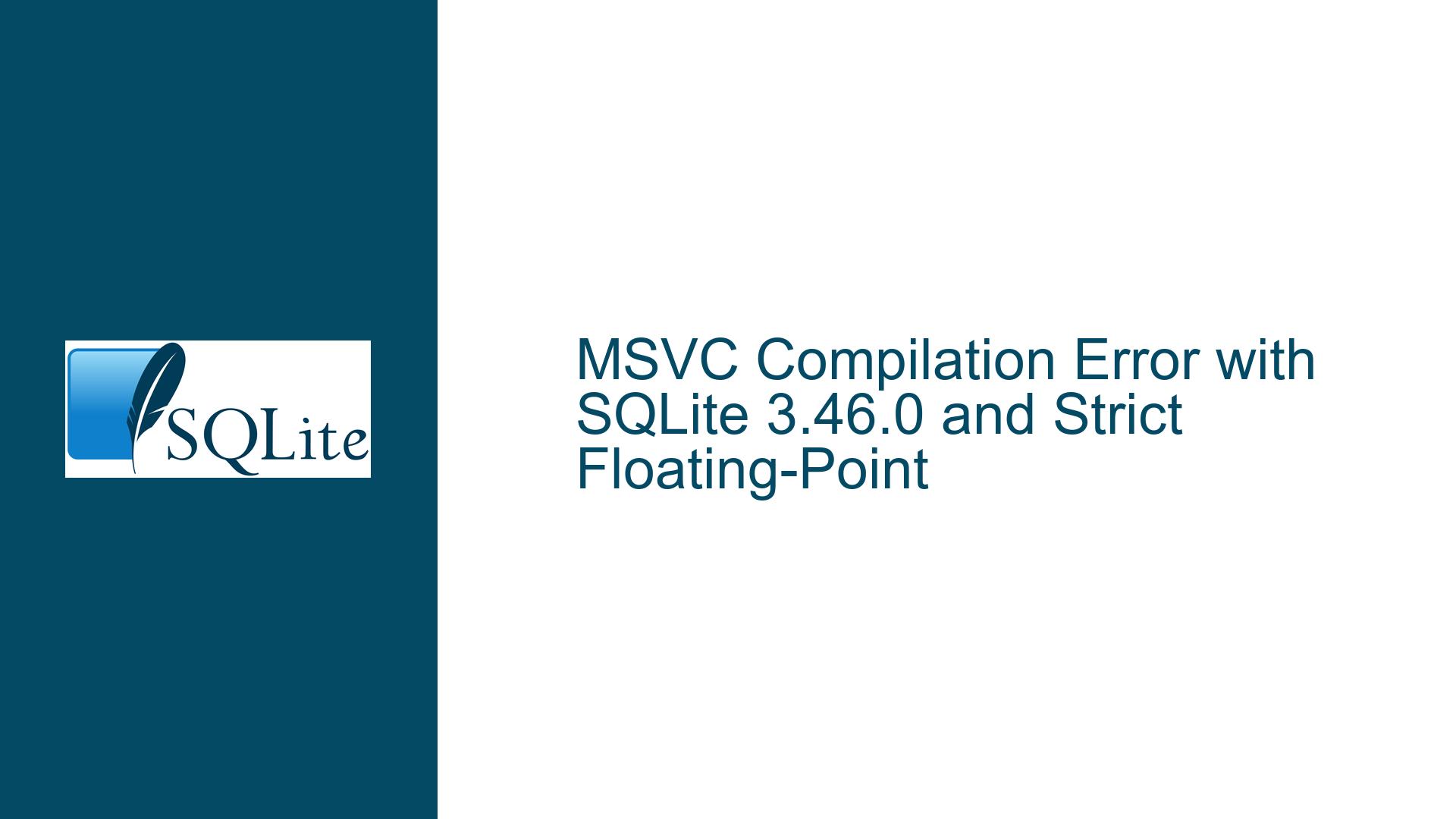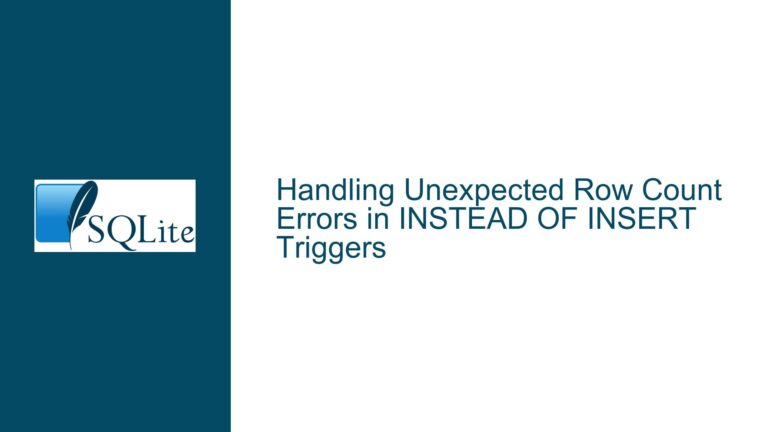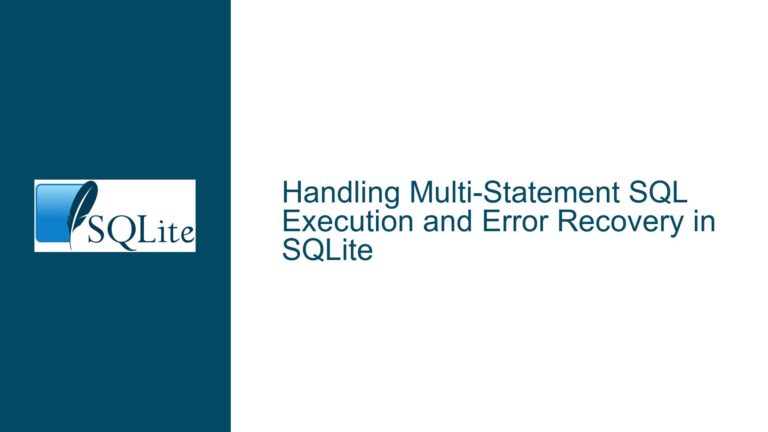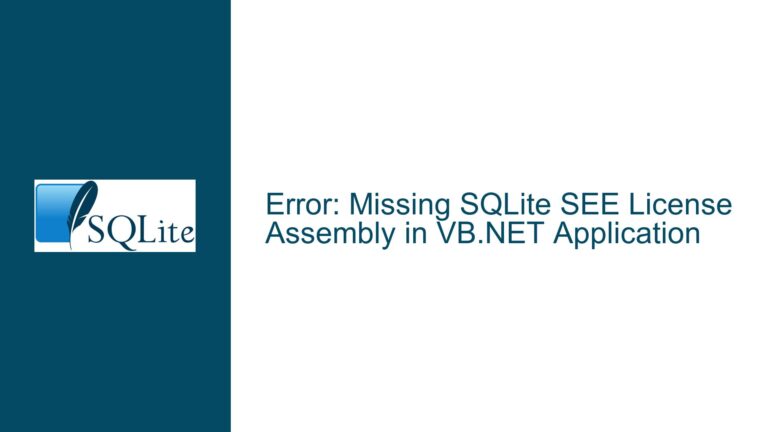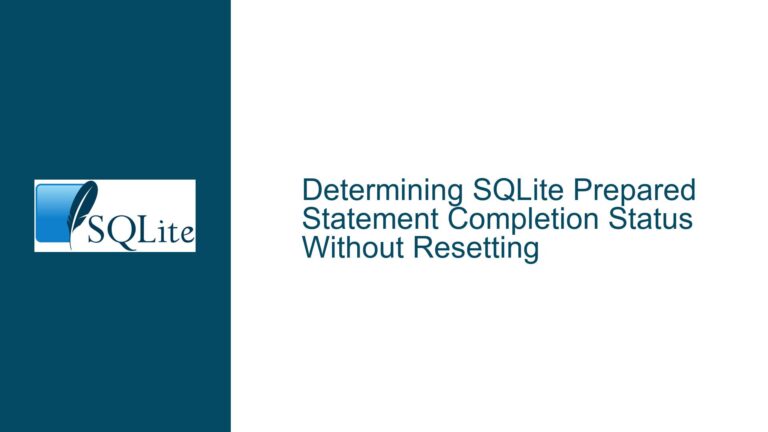MSVC Compilation Error with SQLite 3.46.0 and Strict Floating-Point
Issue Overview: MSVC Compilation Error with Non-Constant Initializers in SQLite 3.46.0
The core issue revolves around a compilation error that occurs when attempting to compile SQLite version 3.46.0 using Microsoft Visual C++ (MSVC) with strict floating-point behavior enabled. The error is triggered by the reintroduction of non-constant initializers in the SQLite source code, specifically in a commit that modifies how floating-point values are initialized. This issue is particularly prominent when using MSVC version 14.39.33519 (Visual Studio 2022) on ARM64 architecture, as reported in a CI (Continuous Integration) environment for a Node.js project.
The error manifests when the /fp:strict flag is enabled in MSVC, which enforces strict floating-point behavior. This flag is designed to ensure consistent floating-point calculations across different systems by adhering to strict IEEE 754 standards. However, MSVC’s handling of floating-point initializers under this flag is more restrictive compared to other compilers, leading to compilation failures when non-constant initializers are used.
The problem is compounded by the fact that the SQLite development team does not encounter this error in their testing environments, suggesting that the issue is specific to certain configurations of MSVC or build settings. This discrepancy highlights the challenges of maintaining cross-platform compatibility, especially when dealing with compiler-specific behaviors and optimizations.
Possible Causes: MSVC’s Strict Floating-Point Behavior and Non-Constant Initializers
The root cause of the compilation error lies in the interaction between MSVC’s strict floating-point behavior and SQLite’s use of non-constant initializers for floating-point variables. To understand this, it is essential to delve into the specifics of both MSVC’s floating-point handling and SQLite’s initialization patterns.
MSVC’s /fp:strict Flag and Floating-Point Initialization
The /fp:strict flag in MSVC enforces strict adherence to IEEE 754 floating-point standards, which includes restrictions on how floating-point values are initialized. Under this flag, MSVC requires that floating-point initializers be constant expressions. A constant expression is one whose value can be determined at compile time, such as a literal value or a compile-time constant. Non-constant initializers, which rely on runtime calculations or values, are not permitted under /fp:strict.
This behavior is unique to MSVC and is not enforced by other compilers like GCC or Clang, which may allow non-constant initializers even under strict floating-point modes. The rationale behind MSVC’s restriction is to ensure that floating-point calculations are consistent and predictable across different platforms and architectures, particularly in scenarios where floating-point precision and behavior are critical.
SQLite’s Use of Non-Constant Initializers
In SQLite version 3.46.0, a specific commit reintroduced non-constant initializers for floating-point variables. These initializers rely on runtime calculations or values that cannot be determined at compile time. While this approach may be valid and efficient in many contexts, it conflicts with MSVC’s strict floating-point requirements when the /fp:strict flag is enabled.
The reintroduction of non-constant initializers suggests that the SQLite development team either did not anticipate the impact of this change on MSVC builds or did not test the change under configurations that enforce strict floating-point behavior. This oversight underscores the importance of comprehensive testing across different compilers and build settings, especially for a widely-used library like SQLite.
ARM64 Architecture and MSVC
The issue is further complicated by the fact that the compilation error occurs specifically on ARM64 architecture. ARM64, being a relatively newer and less commonly used architecture in desktop environments, may have different floating-point handling characteristics compared to x86 or x64 architectures. MSVC’s implementation of strict floating-point behavior on ARM64 may be more stringent or exhibit subtle differences that exacerbate the issue.
Additionally, the use of MSVC version 14.39.33519 (Visual Studio 2022) introduces another layer of complexity. Newer versions of MSVC may include updated floating-point handling logic or stricter enforcement of standards, which could contribute to the compilation error. This highlights the need for continuous testing and validation across different compiler versions and architectures.
Troubleshooting Steps, Solutions & Fixes: Addressing the MSVC Compilation Error
Resolving the MSVC compilation error requires a multi-faceted approach that addresses both the immediate issue and the underlying causes. Below are detailed steps and solutions to troubleshoot and fix the problem.
Step 1: Verify Build Configuration and Compiler Settings
The first step is to verify the build configuration and compiler settings being used in the CI environment. Specifically, ensure that the /fp:strict flag is explicitly set and that no other conflicting flags are present. Review the MSVC documentation to confirm the exact behavior of the /fp:strict flag and its interaction with other floating-point-related flags.
If the /fp:strict flag is not strictly necessary for the project, consider using a less restrictive floating-point mode, such as /fp:precise or /fp:fast. These modes provide more flexibility in floating-point initialization and may resolve the compilation error without significantly impacting the project’s floating-point behavior.
Step 2: Modify SQLite Source Code to Use Constant Initializers
If the /fp:strict flag is required, the SQLite source code must be modified to use constant initializers for floating-point variables. This involves identifying the specific variables and initializers that are causing the compilation error and replacing them with compile-time constant expressions.
For example, consider the following code snippet that uses a non-constant initializer:
double x = some_function_call();
This can be modified to use a constant initializer:
const double x = 3.14159; // Example constant value
If the initial value must be computed at runtime, consider initializing the variable to a default value and then updating it later in the code:
double x = 0.0; // Default value
x = some_function_call(); // Update value at runtime
Step 3: Update SQLite Build System to Include /fp:strict Testing
To prevent similar issues in the future, the SQLite build system should be updated to include testing with the /fp:strict flag enabled. This ensures that any changes to the source code are validated against MSVC’s strict floating-point requirements before being released.
This can be achieved by adding a new build configuration or target in the SQLite build system that enables the /fp:strict flag. This configuration should be included in the CI pipeline to automatically test for compatibility with MSVC’s strict floating-point behavior.
Step 4: Collaborate with the SQLite Development Team
If the issue persists or requires significant changes to the SQLite source code, consider collaborating with the SQLite development team to address the problem. Provide detailed information about the compilation error, including the specific commit that reintroduced non-constant initializers, the MSVC version and architecture where the error occurs, and the steps taken to reproduce the issue.
The SQLite development team may be able to provide additional insights or solutions, such as alternative initialization patterns or compiler-specific workarounds. They may also consider incorporating the /fp:strict flag into their testing process to prevent similar issues in future releases.
Step 5: Explore Alternative Compilers or Build Environments
If modifying the SQLite source code or build system is not feasible, consider exploring alternative compilers or build environments that do not enforce strict floating-point behavior. For example, using GCC or Clang on a non-Windows platform may avoid the compilation error altogether.
However, this approach should be used as a last resort, as it may introduce additional complexities or limitations, particularly if the project relies on Windows-specific features or integrations.
Step 6: Document the Issue and Solution for Future Reference
Finally, document the issue and the steps taken to resolve it for future reference. This documentation should include details about the compilation error, the specific MSVC version and architecture where the error occurred, the changes made to the SQLite source code or build system, and any workarounds or alternative solutions that were considered.
This documentation serves as a valuable resource for other developers who may encounter similar issues and helps ensure that the problem does not reoccur in future projects or releases.
By following these troubleshooting steps and solutions, the MSVC compilation error with SQLite 3.46.0 and strict floating-point behavior can be effectively addressed. The key is to understand the interaction between MSVC’s strict floating-point requirements and SQLite’s initialization patterns, and to implement changes that ensure compatibility across different compilers and architectures.
